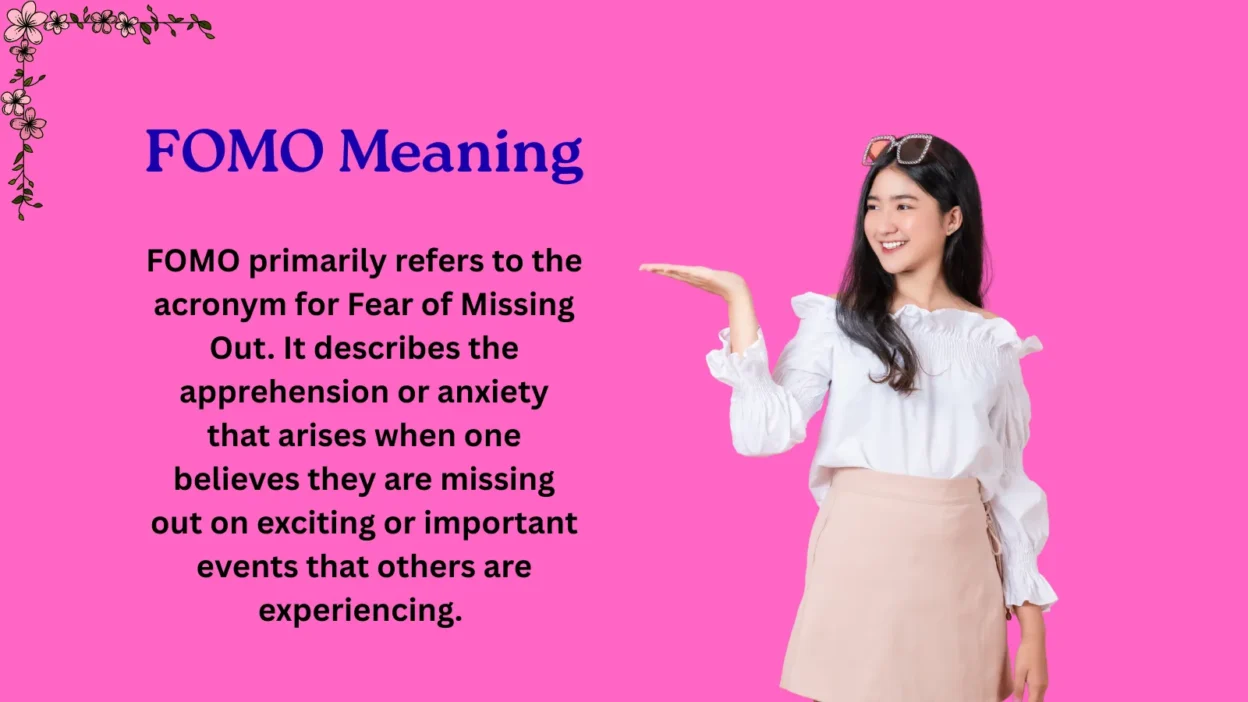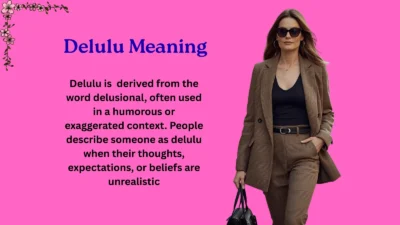FOMO meaning reflects a modern social phenomenon tied to anxiety, digital culture, and the fear of missing out on experiences, events, or opportunities. Commonly used in conversations, social media, and marketing contexts, FOMO captures the feeling of worry that others are having rewarding experiences while you are not.
Understanding FOMO can help you navigate social pressures, online interactions, and personal decision-making. In this guide, we’ll explore its origins, significance, usage, and examples to fully grasp what FOMO really means in daily life.
What Does “FOMO” Mean?
FOMO primarily refers to the acronym for Fear of Missing Out. It describes the apprehension or anxiety that arises when one believes they are missing out on exciting or important events that others are experiencing. While the term originates in modern digital culture, the feeling it represents has existed for much longer.
Example Sentences:
- “I couldn’t say no to the party because of my FOMO.”
- “Scrolling through Instagram gives me serious FOMO about everyone’s vacations.”
Key Points to Remember:
- FOMO stands for Fear of Missing Out.
- It is linked to anxiety, social comparison, and digital media.
- The term is widely recognized in psychology, social media, and pop culture.
FOMO Origin
The term FOMO was first popularized in the early 2000s, particularly in the context of social media platforms like Facebook and Instagram, which made people more aware of events, experiences, and opportunities they weren’t part of. Psychologists and marketers quickly adopted it to describe a modern form of social anxiety.
Historically, the feeling behind FOMO is universal: humans have always compared themselves to others to evaluate their social standing or opportunities. Modern technology has simply amplified its reach and intensity.
Historical Context and Notable Appearances:
- In 2004, FOMO was included in academic discussions of social behavior.
- Social media marketing campaigns often leverage FOMO to encourage immediate action or engagement.
- The term appears in mental health studies discussing anxiety, peer pressure, and decision-making.
In short, FOMO has evolved from a general human feeling into a cultural term, symbolizing the anxiety linked to missing out in the digital age.
Usage in Various Contexts
Social Media and Digital Life
Online platforms are a common trigger for FOMO, as users see friends, influencers, or celebrities participating in exciting activities. For example:
“Seeing everyone at Coachella gave me extreme FOMO.”
Marketing and Consumer Behavior
FOMO is frequently leveraged in marketing campaigns to create urgency, prompting consumers to act quickly. Consider:
“The limited-time offer triggered my FOMO—I bought the shoes immediately.”
Personal and Social Situations
Everyday decisions, from choosing which events to attend to selecting hobbies or travel plans, can be influenced by FOMO. One might say:
“Even though I was tired, FOMO made me go out with friends.”
Professional Contexts
In business or networking scenarios, FOMO can motivate professionals to attend seminars, conferences, or opportunities they might otherwise skip. For instance:
“I signed up for the workshop because of FOMO—everyone in my industry was attending.”
FAQs
What does FOMO feel like?
FOMO typically involves anxiety, restlessness, or dissatisfaction when you perceive others are enjoying experiences you are missing.
Is FOMO a real psychological condition?
While not a clinical diagnosis, FOMO is recognized in psychology as a form of social anxiety or fear that affects mental well-being.
Can FOMO be positive?
Yes. In some cases, FOMO can motivate personal growth, social engagement, or trying new experiences.
Is FOMO common in all age groups?
It is most commonly reported among teens and young adults, particularly heavy social media users, but it can affect anyone.
Final Thoughts
FOMO may seem like a modern trend, but it reflects a deeper human concern with connection, belonging, and opportunity. From social media to marketing, it shapes decisions, behaviors, and even mental health. Understanding FOMO meaning helps navigate anxiety, balance online engagement, and make conscious choices about participation and presence in life.
Whether you’re managing social media use, evaluating career opportunities, or simply curious about cultural trends, knowing about FOMO adds clarity to your personal and social experiences.





